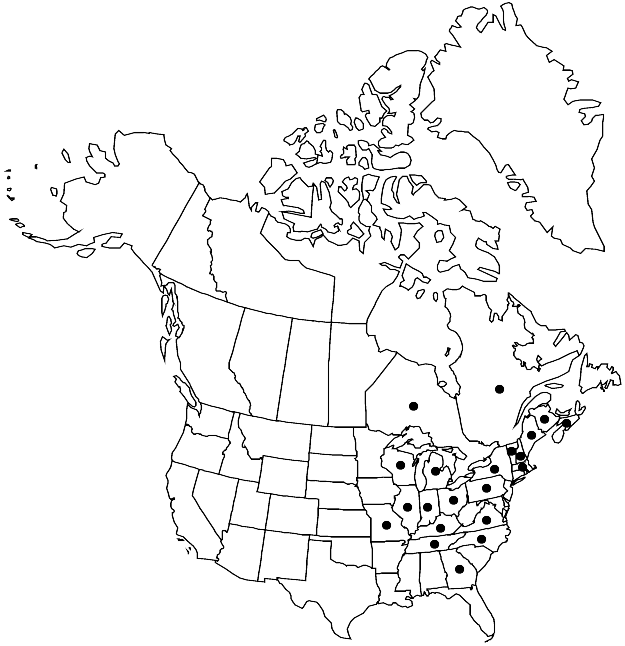Anomodon rugelii
Ann. K. K. Naturhist. Hofmus. 15: 214. 1900.
Plants small, in thick, dense mats, dark green to rusty brown. Stems to 3.5 (–5) cm, 0.8–1.5 mm thick when dry, poorly branched, primary branches erect-ascending, somewhat arcuate; central strand cells differentiated; pseudoparaphyllia foliose; rhizoids many. Branch leaves incurved-contorted when dry, erect-spreading, somewhat secund when moist, broadly oblong-ligulate, (1.2–) 1.4–2.3 (–2.5) mm; base auriculate; margins plane, spiny-papillose in auricles, sometimes minutely denticulate in apex; apex broadly obtuse to rounded, often apiculate, intact; costa strong, ending sharply near apex, not obscured by laminal cells distally, 2-fid at end, pellucid, golden yellow to rusty brown, abaxial costa cells smooth; basal laminal cells hyaline, smooth, region occupying more than 1/2 basal portion of lamina; medial and distal cells hexagonal, 7–12 µm, papillae many, branched. Perichaetia at end of terminal secondary branches, leaves abruptly narrowed toward apex, becoming almost subulate, laminal cells papillose. Seta (0.5–) 0.9–2.2 cm. Capsule elongate, urn (1–) 1.8–2.3 (–2.5) mm; stomata at base; annulus absent; operculum obliquely short-rostrate, 0.5–0.8 mm; exostome teeth regular, 0.1–0.3 mm, papillose, often inconspicuously horizontally striolate at base, trabeculate distally; endostome rudimentary, basal membrane 2–4 (–6) cells high, segments very reduced or absent. Spores 9–14 µm, slightly papillose.
Phenology: Capsules mature mid fall.
Habitat: Tree trunks (generally 1-2 m above base), basic and acidic rock, montane deciduous forests
Elevation: moderate to high elevations
Distribution

N.B., N.S., Ont., Que., Ga., Ill., Ind., Ky., Maine, Mass., Mich., Mo., N.H., N.Y., N.C., Ohio, Pa., Tenn., Vt., Va., Wis., c, n Europe, Asia
Discussion
Distinctive characters for Anomodon rugelii include the rusty brownish color, feltlike primary branches due to the abundance of rhizoids, more slender branches with strongly incurved leaves when dry, redness of the costa, and above all, conspicuous auricles at the leaf base. The auricles have long-branched papillae on the margins. Apiculate leaves are not a reliable character, as there are many plants the leaves of which are obtuse to rounded and lack an apiculus. Anomodon rugelii usually has foliose pseudoparaphyllia, although they can sometimes be completely 1-seriate. Fruiting mats are infrequent, but when found, sporophytes are produced in abundance. The perigonial leaves have crenulate distal margins and laminal cells with few to no papillae. The branch leaf costae are sometimes slightly flexuose.
Selected References
None.